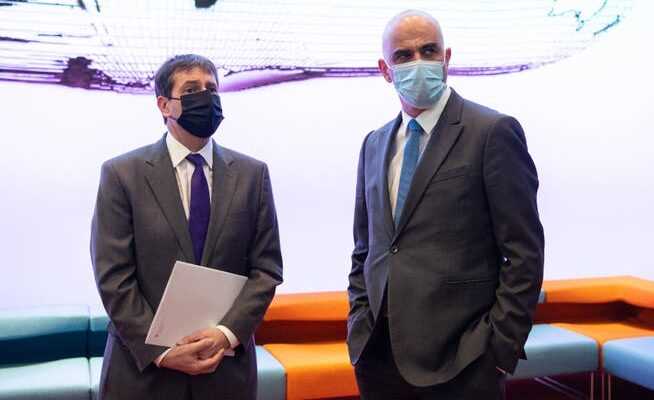The regime of measures shows signs of dissolution. But the government does not want to let go just yet.
Federal Councilor Alain Berset and Federal Council Spokesman André Simonazzi.
Alain Berset is omnipresent. The Minister of Health speaks to the media. And tweets in three national languages at the same time. Of course it is his staff that feeds his messages into the channels. And the “Blick” reported the evening before what the Federal Council is planning. Berset’s communications machinery is up and running after a two-year pandemic.
Everything as usual. But what is there to say right now? “We are in the middle of the fifth wave,” notes Berset. In a pandemic, there are no shortcuts. Caution and patience are still required. “We must go the way to the end.” Berset’s long-distance metaphors have become commonplace. What good is an iterative approach if the goal is not exactly known?
Fewer Covid patients in intensive care units
Of course, the Federal Council also wants to get out of the pandemic. When and how exactly this should happen is not yet discussed. “It’s just difficult, if not impossible, to say where we are today.” Berset is currently not making health policy, but is doing psychology.
The current starting position is actually difficult to convey. With almost 40,000 infections, the BAG reported a new record on Wednesday. The number of cases has installed itself in the collective memory like a barometer of measures. So far, high case numbers have meant stricter interventions. If the number of cases increases, the beds in the intensive care units will become scarcer.
However, this logic has changed with the Omikron variant and, above all, with the greatly increased immunity protection of those who have been vaccinated and those who have recovered. While there were still over 320 Covid patients in the intensive care units shortly after Christmas, according to Berset there are now 247. The situation in the hospitals is under control, but remains uncertain. The Federal Council remains in a state of limbo, between the feared omicron wall and the hoped-for endemic phase. In his monothematic Corona meeting on Wednesday, he therefore decided to temporarily and gradually extend the previous measures.
Involuntary loosening due to a lack of testing capacity
The latest look at the tableau of measures shows the following adjustments: the home office obligation and the contact quarantine will be extended until the end of February, the other rules until a month later. The 2-G and 2-G-plus rule in certain indoor areas therefore applies until the end of March. Likewise the 3-G rule for outdoor events and with more than 300 people as well as the restriction of private meetings. The period of validity of the certificate obligation will be reduced from one year to 270 days as of February 1st – so that the certificate remains valid in the EU as well.
The test regime when entering Switzerland will be relaxed. From Saturday, vaccinated and recovered people will no longer have to show a negative test. Discos and churches are no longer required to record the contact details of their visitors. The mask requirement will not be tightened. And positive rapid antigen tests are sufficient from January 24 for those who have recovered to receive a certificate. However, this is only valid for Switzerland.
Overall, one can say that the Federal Council is sticking to the previous regulations. At the same time, the strictness of the regime is decreasing. The signs of dissolution are less due to political will than to the omicron logic of the pandemic. The entry restrictions and the conditions for the convalescent certificate are relaxed because the laboratory capacities are very busy or even overloaded. The high case numbers also lead to more tests and corresponding bottlenecks in test logistics.
New layout in two weeks
Not only the population is Corona-tired. The patience of the health minister also seems to be waning. He is now in the uncomfortable situation that, given the current situation, he is vulnerable to attack from two sides. Skeptical voices are calling for a rapid exit. Proponents of measures want the Federal Council to tighten the screw again.
Wednesday’s media conference also showed that strange reflexes crept into Berset’s performances. Criticism of the Federal Council increasingly implies calls for more severe state intervention in public and private life. The Federal Council still considers the current measures to be drastic and wants to dissolve them as soon as possible, Berset countered.
Yet it is not so far. The Federal Council as a whole has agreed on an in-depth discussion on February 2, i.e. in two weeks. Then you want to determine a new layout and the next steps. The strategic ulterior motive is clear. The reputational risks for the Federal Council are much smaller if it initially extends the measures. He can then abolish them again in mid-February – so to speak “earlier than planned”.
Conversely, it is far more difficult. An abrupt exit at the crest of the highest wave of contagion to date does not correspond to the previous logic. It would look like going too far with the waves ahead. Berset did not say on Wednesday that everything is over now. But so far the Federal Council’s strategy has worked to some extent. It seems as if he is already fighting for the narrative for dealing with the crisis.
